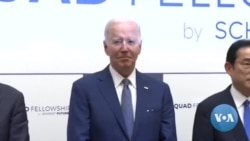U.S. Secretary of State Anthony Blinken will make a major policy speech on Thursday at George Washington University detailing the Biden administration’s approach to relations with China.
“The Asia Society will host Secretary of State Antony J. Blinken in delivering an address outlining the administration's policy toward the People’s Republic of China at 10:00 a.m. on Thursday, May 26, 2022,” said the State Department in a statement. Blinken’s China speech was postponed after the secretary tested positive for COVID-19 on May 4.
Blinken’s remarks will follow U.S. President Joe Biden’s visit to Japan where he said the U.S. would be willing to intervene militarily to defend Taiwan if China were to invade the island democracy. Biden later clarified there is no change to the U.S. policy of strategic ambiguity on Taiwan.
Top officials from the U.S. and its Asian allies have said Russia’s aggression against Ukraine undermines the foundation of the international order, and any attempt to change the status quo by force in Asia or in other parts of the world is unacceptable.
“The U.S. is always doing what it can to prevent a worst-case scenario,” said Matthew Funaiole, a senior fellow of Center for Strategic and International Studies’ China Power Project. He expected Blinken would use carefully crafted language to reiterate Washington’s one-China policy.
“The U.S. has long held that it is up to the people of Taiwan to determine their future and that that future should be decided peacefully. Russia’s invasion of Ukraine has brought this nuance of U.S. policy toward Taiwan to the forefront of conversations,” Funaiole told VOA.
U.S. officials have said Washington's “one-China policy” differs from Beijing's “one-China principle.”
Tuesday, State Department spokesperson Ned Price said senior Chinese officials in their briefings and statements have “frequently attempted to misrepresent” Washington’s policy. Price told reporters that the Chinese readout issued after White House National Security Advisor Jake Sullivan’s call with top Chinese diplomat Yang Jiechi on May 18 incorrectly stated that the U.S. pursues Beijing’s one-China principle.
“The PRC (People’s Republic of China) continues to publicly misrepresent U.S. policy,” said Price in a recent tweet. “The United States does not subscribe to the PRC’s ‘one China principle’ – we remain committed to our longstanding, bipartisan one China policy, guided by the Taiwan Relations Act, Three Joint Communiques, and Six Assurances.”
For decades, the U.S. has been clear that its decision to establish diplomatic relations with China in 1979 rested upon the expectation that “the future of Taiwan will be determined by peaceful means,” as stipulated in the Taiwan Relations Act.
The Chinese Communist Party (CCP) has never ruled Taiwan but asserts sovereignty over the self-ruled democracy. CCP has not ruled out the use of force to bring Taiwan under its control.
The U.S. has never accepted the CCP's sovereignty claim over Taiwan and has refrained from taking a position on sovereignty over Taiwan.
“The president is very, very committed to the idea that we can’t allow ourselves to be overly focused on Ukraine – that the administration needs to continue doing what it laid out from the very beginning of its time in office in terms of really focusing on the Indo-Pacific and expanding and strengthening our position and our relations in the Indo-Pacific,” said Edgard Kagan, a senior director for East Asia and Oceania on the National Security Council, speaking with reporters in a recent briefing.







